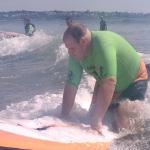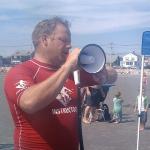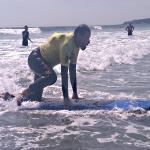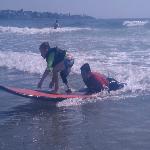Learning to surf would be challenging for anyone, most especially someone like Dana Cummings, who mastered the sport after losing his leg in a car accident.
Now, he shares his love of riding the waves with other people with disabilities.
AmpSurf, the California-based organization Cummings founded in 2003, has offered free surfing classes to hundreds of people, with the help of private donations and volunteers. This year, AmpSurf took its clinics to the East Coast for the first time.

VOA - J. Huang
Matthew Fish - whose vision is so poor, he needs a cane to get around - learns to surf.During one lesson at a beach in Maine, Cummings instructs Matthew Fish, 27, who is visually impaired. Cummings puts Fish's hand on his shoulder, and leads him into chest-deep water, floating the surfboard next to him.
Fish starts out by lying on the board, with Cummings and a couple of volunteers wading alongside. It only takes a few tries before Fish rises to his knees and rides a wave to shore.
"That was a thrill!" Fish says before giving it another go.
Cummings survived two tours of duty as a Marine during the 1990 Gulf War, only to lose his leg in a 2002 car accident. A software engineer after leaving the military, Cummings attitude toward life changed after the crash.

VOA - J. Huang
AmpSurf founder Dana Cummings commands the beach with his megaphone as he welcomes participants to a surfing class in Maine."I was just existing, not living," Cummings says. "It took me to lose my leg to get me to realize how precious life is and get off the couch and start living. I do more things now than I ever did before. Next week, I am going to compete in a contest in Hawaii."
His sense of daring is infectious, even for someone like Matthew Fish, who tries surfing despite vision that is so poor, he needs a cane to get around.
"I can see, like, the foam, the white cap, and I can see the wave, but I can't really tell what form it is or if it's ride-able," Fish says. "I wiped out a couple times, but as I always say, if you don't fall once in a while you're not having enough fun."
More athletic programs - everything from skiing to soccer and basketball - are available to disabled people than ever before, but surfing classes are less common.
The 11 clinic participants have come here from all across the Northeast for the chance to ride the waves. One family drove six hours from New Jersey. They are joined by more than 30 volunteers who have taken off from work to help Cummings.

VOA - J. Huang
Stricken with polio at an early age, Brian Foss, 57, uses crutches but still enjoys skiing, bicycling and surfing.Fifty-seven-year-old Brian Foss from New Hampshire was stricken by a neuromuscular disease early in life.
"I had polio in 1955, when I was two years old, the year the vaccine came out, actually. I missed it by a little bit," says Foss.
However, despite the weakness in his legs and his need for crutches, he has fallen in love with downhill skiing, bicycling, and now surfing. "It's a sense of being able to fly, and a sense of freedom. You're not constrained by gravity, almost."
AmpSurf's instructors, who are trained to work with people with disabilities, gave Foss the assurance to try surfing.
"These guys just kind of give you that confidence and make you believe you can do it," he says. "They're strong so I know that I can hang on them if I need to when I'm walking out. I know that I'm not going to get in trouble."
The youngest participant in the class Foss is participating in is six-year-old Shaun McLaughlin from Massachusetts, who was born without a right foot and started using a prosthesis before he could walk. Shaun starts out by practicing surfing on the sand before moving out onto the water.
"Most people with disabilities their whole life, everybody focuses on their disability, and we want them to see what they can do," Cummings says. "Who cares, you lost your leg, you're blind, whatever. Have fun. Just enjoy life. Take the most advantage of it as you can."
Cummings plans to develop more of an East Coast presence for AmpSurf. He and his staff expect to return to Maine, New York and New Jersey next year to train volunteers to become instructors, and to turn more people into surfers.
